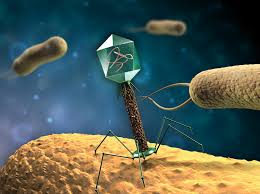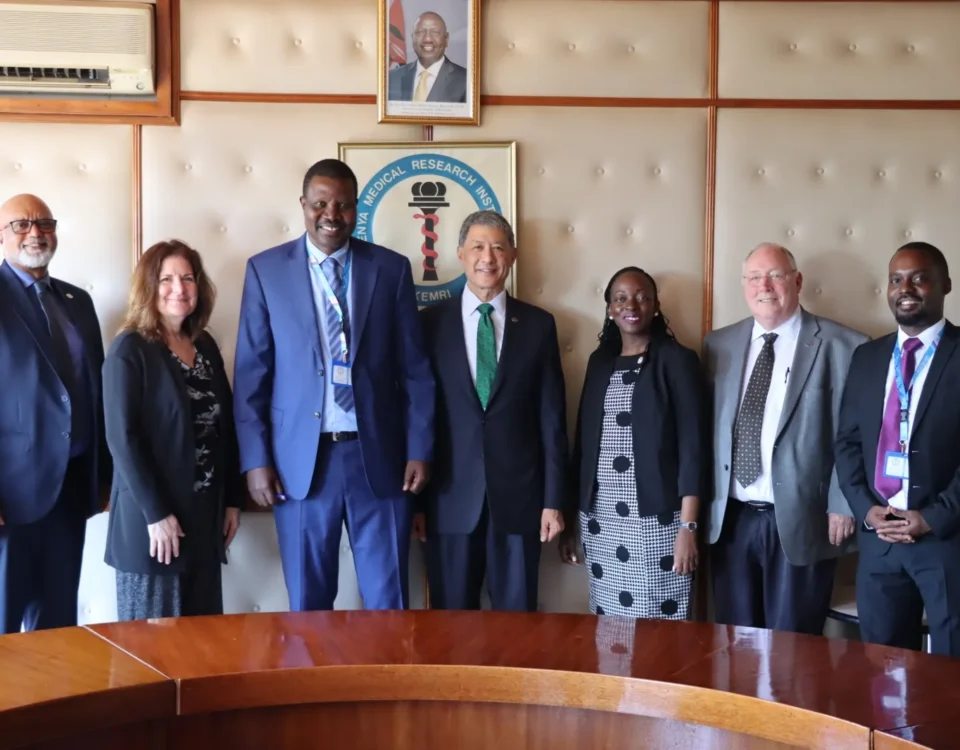
KEMRI to Host National Reference Laboratory for Stem Cell Research in Kenya
March 1, 2022
BACTERIOPHAGES (PHAGES) TO COMPLEMENT EFFORTS TO TACKLE ANTIMICROBIAL RESISTANCE
March 23, 2022KEMRI partners with Ohio University to improve Food Security and Nutrition in Kenya.

KEMRI has partnered with Ohio State University, Feed the Future Innovation Lab for Food Safety (FSIL) and the University of Nairobi through the Chakula Salama Project to improve food security and nutrition in Kenya by developing capacity for systems-based, risk-informed approaches to food safety that reduce risk of Foodborne Diseases, increase production of safe food, and improve economic outcomes.
The partners organized a 3-day Risk Ranking Workshop at KEMRI Headquarters Training Centre last week (14th – 18th March 2022) to engage farmers, and experts to develop interventions required in the reduction of Foodborne illness in Kenya.
The Chakula Salama project has put its emphasis on small scale poultry farming in Kiambu County as a baseline for its study and research, since it’s an important dietary aspect of the poor, middle class households and a source of revenue to a bigger population of the youth and women. This research will look at the number of factors that lead to foodborne illnesses caused by poultry right from rearing, harvesting and cooking/preparation.
Through the Chakula Salama project, evidence drawn from farmers, on various levels of poultry farming, environmental and personal, wearing of protective clothing when feeding or visiting the poultry farm will be used in the reduction of contamination and spread of any virus or bacteria from human to poultry and vice versa.
Studies have also shown that chemical washes are effective against pathogens such as campylobacter species and salmonella load reductions. However, the farmers need training on dosages and applications of the substances in farm settings. Training on using slaughter houses and processing surfaces that are less capable of trapping and retaining salmonella campylobacter.
According to the World Health Organization (WHO), 33 million years of healthy lives are lost due to eating unsafe food globally each year, and this number is likely to be an underestimation. Food borne illness are caused by the consumption of contaminated foods through infections caused by different bacteria, viruses and parasites.
“Foodborne disease (FBD) remain a major cause of illnesses and resultant billions of losses in human capital annually in Africa, including Kenya. From work done from reputable organizations such as Food & Agriculture Organization (FAO), among the approaches available for controlling FBD is a systems-based, risk-informed approach to identify and rank FBD risks.” Stated Prof. Sam Kariuki in his address to the workshop participants. “This three day workshop will lead to a culmination of impactful knowledge that will be cascaded to reach more farmers so as to improve the quality of life and human health through embracing good poultry farming practices”. Prof. Kariuki also noted that KEMRI has the required infrastructure qualified and experienced personnel that will make the project achieve its goal.
|”The primary goal of Chakula Salama Project, which means “safe food” in Swahili, is to improve food security and nutrition in Kenya by developing capacity for systems-based, risk-informed approaches to food safety that reduce risk of Foodborne Diseases, increase production of safe food, and improve economic outcomes,” quipped Dr. Barbara Kowalcyk, the Assistant professor Feed the Future Innovation Lab For Food Safety ( FSIL) who is also the principal investigator of the project.
Antimicrobial resistance (AMR) is a major concern in poultry farming. Improper storage, dosages and administration of antibiotics in rural areas, as well as expiry dates on antibiotics are problematic, particularly to the semi-literate populations. Farmers seek veterinary services in cases of diseases without prescription while others overuse them leading to the development of resistance towards the respective antibiotics. Ingestion of such poultry to humans may lead to resistance to antibiotics overtime. Antimicrobial resistant poultry pathogens may result in treatment failure, leading to economic losses, but also be a source of resistant bacteria or genes that may represent a risk to human health. The experts warned that the antibiotics should only be used in cases of diseases in the poultry.
Particularly, this project has employed a systems-based, risk-informed approach to ask and answer important food safety questions and build the foundation for an enabling environment that fosters the implementation of risk-based approaches to food safety in Kenya while advancing the objectives in the country’s 2013 National Food Safety Policy. The project will run for 3 and ½ years in Kenya and is implemented by USAID, through Feed the Future Innovation Lab (FSIL) and its collaborating partners.
Those in attendance at the workshop also include Dr. Robert Onsare Co-Principal Investigator, and Research scientist-KEMRI, Dr. Musila, Research Scientist-KEMRI, Dr. Kara Morgan Co-Principal Investigator, Dr. Haley Oliver Associate Director FSIL, Prof. Lily Bebora, Lecturer Veterinary Microbiology University of Nairobi, Dr. Tabitha Gathecha, Agriculture Officer Kiambu County and Anthony Kagucia, Veterinary, Gatundu Sub County.

